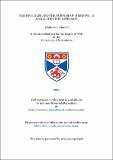Files in this item
Faithfulness and the purpose of Hebrews : a social identity approach
Item metadata
| dc.contributor.author | Marohl, Matthew J. | |
| dc.coverage.spatial | 250 p. | en_US |
| dc.date.accessioned | 2018-05-22T12:57:03Z | |
| dc.date.available | 2018-05-22T12:57:03Z | |
| dc.date.issued | 2005 | |
| dc.identifier.uri | https://hdl.handle.net/10023/13456 | |
| dc.description.abstract | It has become commonplace for interpreters to refer to Hebrews as a 'mysteiy,' or an 'enigma.' Indeed, many questions have remained unresolved. The aim of this thesis is to provide fresh answers to several questions by employing that branch of social psychology known as social identity theory. Who were the addressees? Relating the text to social identity theory, I conclude that the addressees categorised the world into two groups, 'us' and 'them.' They understood their group, 'us,' to be the 'faithful.' Similarly, they understood 'them' (a symbolic outgroup of 'all others'), to be the 'unfaithful.' How did the addressees understand the faithfulness of Jesus? Why did the author compare Jesus with Moses, Melchizedek, and others? Relating Hebrews to the theories of 'prototypicality' and 'shared life story,' I argue that the author described the faithfulness of Jesus as 'prototypical,' and that he portrayed all others in relation to Jesus. In addition, he integrated both Jesus and the addressees into an ongoing story of faithfulness. What is the meaning of the promised 'rest?' Utilising a model of 'present temporal orientation,' I conclude that the author described the 'antecedent' faithfulness of many 'witnesses' and the 'forthcoming' promised rest of the addressees. He also encouraged them to use 'foresight,' to 'consider their future, by looking to the past.' Finally, what was the purpose of the text? Social identity theorists explain that groups with a negative social identity have two broad options: 'social mobility' and 'social change.' I argue that the author provided internal constraints which were meant to prevent 'social mobility,' and utilised 'social creativity' (an aspect of 'social change') to provide a positive social identity for the addressees. | en_US |
| dc.language.iso | en | en_US |
| dc.publisher | University of St Andrews | |
| dc.subject.lcc | BS2775.52M2 | |
| dc.subject.lcsh | Bible.--N.T.--Hebrews.--Criticism, interpretation, etc. | en |
| dc.subject.lcsh | Loyalty--Biblical teaching | en |
| dc.subject.lcsh | Social psychology | en |
| dc.subject.lcsh | Group identity | en |
| dc.title | Faithfulness and the purpose of Hebrews : a social identity approach | en_US |
| dc.type | Thesis | en_US |
| dc.type.qualificationlevel | Doctoral | en_US |
| dc.type.qualificationname | PhD Doctor of Philosophy | en_US |
| dc.publisher.institution | The University of St Andrews | en_US |
This item appears in the following Collection(s)
Items in the St Andrews Research Repository are protected by copyright, with all rights reserved, unless otherwise indicated.

